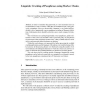Free Online Productivity Tools
i2Speak
i2Symbol
i2OCR
iTex2Img
iWeb2Print
iWeb2Shot
i2Type
iPdf2Split
iPdf2Merge
i2Bopomofo
i2Arabic
i2Style
i2Image
i2PDF
iLatex2Rtf
Sci2ools
IACR
2016
2016
Linguistic Cracking of Passphrases Using Markov Chains
In order to remember long passwords, it is not uncommon users are recommended to create a sentence which then is assembled to form a long password, a passphrase. However, theoretically a language is very limited and predictable, why a linguistically correct passphrase according to Shannon's definition of information theory should be relatively easy to crack compared to bruteforce. This work focuses on cracking linguistically correct passphrases, partly to determine to what extent it is advisable to base a password policy on such phrases for protection of data, and partly because today, widely available effective methods to crack passwords based on phrases are missing. Within this work, phrases were generated for further processing by available cracking applications, and the language of the phrases were modeled using a Markov process. In this process, phrases were built up by using the number of observed instances of subsequent characters or words in a source text, known as ngrams,...
Biometrics | IACR 2016 |
Related Content
| Added | 03 Apr 2016 |
| Updated | 03 Apr 2016 |
| Type | Journal |
| Year | 2016 |
| Where | IACR |
| Authors | Peder Sparell, Mikael Simovits |
Comments (0)

